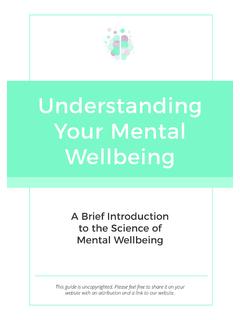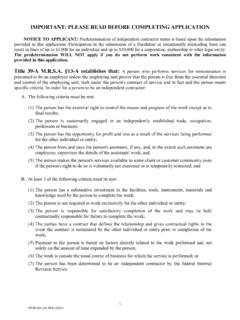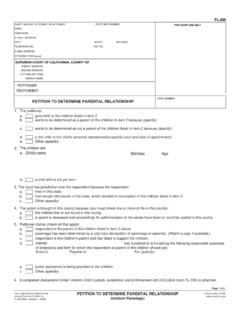Transcription of Step 1. Establish Your Why
1 How to Be More Assertive If you have difficulty with assertiveness, you might have a history of being invalidated, criticized, bullied, or abused. Maybe when you did stand up for yourself in the past, you were attacked. So it felt safer to go with the flow. There are some situations, however, when you need to take a stand. And if you're ready to do that, these are the worksheets for you! Here's how to cultivate assertiveness in 4 steps. Step 1. Establish Your Why Being more assertive is hard. Figuring out how assertiveness will benefit you will help you stay motivated - even when it gets tough.
2 Here are just a few reasons why assertiveness is a good thing. Tick the reasons that speak to you. Elaborate on them and note anything else you can think of in the box below. Assertiveness will help me get my wants and needs met. By being more assertive, people will know what my wants and needs are. Them knowing increases the likelihood that they will help me or change behaviors that are unhelpful. Assertiveness will bring me closer to the people in my life. If they know my wants and needs, they'll know me better, too. Sharing more about myself will help them feel comfortable sharing more about themselves, therefore bringing them closer.
3 Assertiveness will help me clarify who is worthy of my energy and time. People who don't care about my wants and needs don't care about me, either. If I repeatedly ask for my wants and needs to be met and the other person doesn't honor those wishes, it may be in my best interest to reduce their role in my life. Assertiveness will increase my self-esteem. Standing up for myself will help me be myself. When I am more myself, I will feel like I am living in better alignment with my values. Assertiveness will help me advance my career. Like everyone else, my boss cannot read my mind.
4 If I don't ask, I won't get. By asking, I increase my chances of a getting a raise, a promotion, etc. 2. Failure is part of life.. ASSERTIVENESS WORKSHEETS WRITTEN BY REBECCA OGLE, LCSW. Step 2. Practice Assertiveness Tip 1. Develop a Script Sometimes, in the moment, it can be hard to think of what to say. So, decide on some go-to lines. No, thank you.. Please stop.. I'm not comfortable with that.. That won't work for me, but this is what would . When you [name a specific behavior], I feel [emotion], because [reason].. Tip 2. Practice Scripts in the Mirror, With a Friend, or With a Therapist It may feel silly, but role playing really does help!
5 It shows that you are capable of being assertive and increases your confidence. Role play with situations you're currently facing, even if you don't actually plan to be assertive in those situations in real life. How and when will you practice your scripts? Plan below. Tip 3. When in Doubt, Delay In the moment when you're presented with an opportunity to be assertive, you may freeze and forget your scripts. When this happens, delay giving a firm answer so you can buy yourself more time to think. Here are some ways to do that: I need some time to think about it.
6 Let me get back to you on that.. I need to get some more information before I decide.. THE WELLNESS SOCIETY PERMISSION TO USE FOR THERAPY AND COACHING PURPOSES. Step 3. Make and Rank a List of Situations / People Where You Want to Be More Assertive Here's an example list. Tick the boxes that apply and add more as appropriate. At work With my co-workers With my boss At school With my teacher With my peers With my parents With my brothers / sisters With my friends With my therapist On social media In public With acquaintances Some people find it easier to be assertive at work than at home.
7 For others, it's just the opposite. So, rank each item in your list, beginning with the easiest situation to be assertive in (starting with #1), and ending with the hardest. If 2 or more items are about the same, go by your personal preference. Where would you rather start practicing? Example Ranked List 5: With my boss - this is the hardest one that I'll practice last 4: With my mom 3: With my friends 2: With my co-workers 1: With my soccer team - I'll start practicing here! My List 5: 4: 3: 2: 1: ASSERTIVENESS WORKSHEETS WRITTEN BY REBECCA OGLE, LCSW.
8 Step 4. Go Time! Now comes the hardest part - putting your assertiveness skills into practice! Starting with your easiest ranked situation, begin looking for opportunities to be assertive. Notice whether or not you're able to implement your assertiveness skills. If not, ask yourself what got in the way. Use the space below to note down your experiences and insights. Share these experiences - no matter how they turned out - with a good friend or your therapist. This person can cheer you on and offer specific feedback to help you. THE WELLNESS SOCIETY PERMISSION TO USE FOR THERAPY AND COACHING PURPOSES.
9 Step 5. Coping With Missed Opportunities and Pushback You know when you agree to something in the moment, and then look back and think, Man, I. wish I hadn't done that ? Or when someone crosses one of your boundaries, you knew you should've spoken up, but for whatever reason, you didn't? Here are some options for how to cope. Show yourself grace. Assertiveness is hard. Of course you're going to flub up now and then! Mistakes are part of the learning process. And hey, maybe there's a good reason you let this one slide. Change your mind. Short of signing a contract, nothing is set in stone.
10 It's totally within your rights to say any of the following: I changed my mind.. After looking at my schedule, I don't actually have time to commit to this.. Remember the other day when you [did a specific behavior]? I didn't know how to bring it up at the time, but that really bothered me.. Remind yourself that there will always be opportunities for practice. Missing one chance to be assertive is okay, because there will be more chances! Show them grace. It's hard to cope with change. With time, people may get used to your increased assertiveness. And if they don't.












